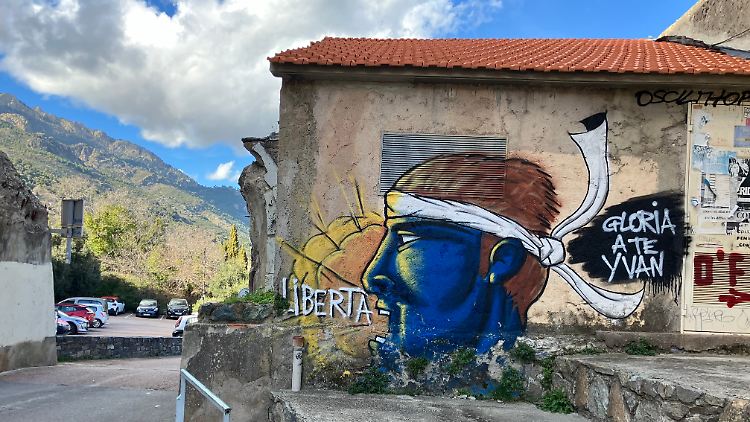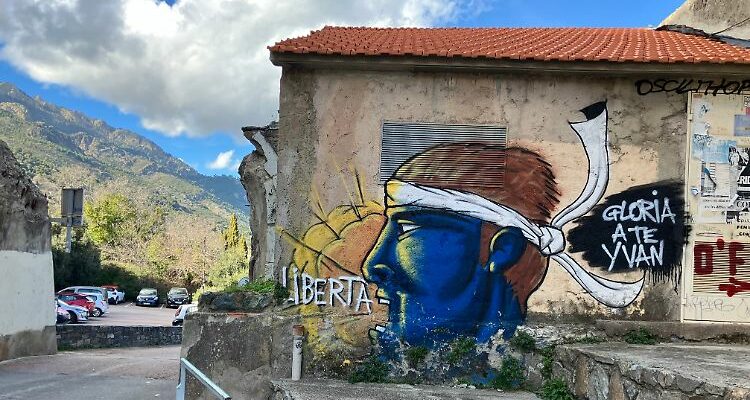The end of violence?
Corsica could soon be autonomous
March 9, 2024, 12:40 p.m
Listen to article
This audio version was artificially generated. More info | Send feedback
Corsica has been part of France since the middle of the 18th century. But the inhabitants of the Mediterranean island have wanted autonomy back for decades. This goal is now within reach.
Violence, riots, deaths – the relationship between the Mediterranean island of Corsica and mainland France has been marked by violent tensions for decades. Separatists and nationalists are striving for more independence from the power center Paris. Your wish is now within reach. President Emmanuel Macron recently launched a constitutional reform for Corsican autonomy. On Monday, Interior Minister Gérald Darmanin will receive a Corsican delegation to negotiate the final formulation. But while this brings hope for a peaceful coexistence for some, others have concerns.

A graffiti in support of Corsican nationalist Yvan Colonna, convicted of murder, is located in the town of Corte.
(Photo: picture alliance/dpa)
Exactly two years ago, violent riots in Corsica kept France on tenterhooks for nights and ultimately brought new momentum to discussions about Corsican demands for autonomy. This was preceded by a fatal attack by a fellow prisoner in prison on the Corsican nationalist Yvan Colonna. Colonna was sentenced to life imprisonment for the murder of the French prefect on the island, Claude Érignac, in 1998. Nationalist movements have existed on the island for a long time. Corsica has been part of France since around the middle of the 18th century.
Even though the riots are long over, anger against France is still noticeable on the island. “The French state is murdering,” “You are all fucking French,” and “Get out of the colonial masters” are spray-painted on the colorful house facades of the coastal town of Bastia. A stencil-like image of Colonna is emblazoned on numerous walls in the old town. In Corte, which is also considered a stronghold of young nationalists, you can even see it from a university building, and a few corners away it even says: “Glory to you, Yvan!” But not all Corsicans share this worldview. On the street, people say that autonomy doesn’t interest them; Some simply appear resigned in view of decades of unsuccessful efforts to distance themselves from Paris.
Legislation is a sensitive issue
At the political level, however, the debate is passionate. The Corsican head of government Gilles Simeoni is clearly trying to achieve unity in the local parliament in Ajaccio. The negotiations over autonomy have never come this far. This comes with an immense responsibility – for peaceful coexistence after decades marked by drama, prison and suffering. “It requires us to push aside everything that is not essential.” What is essential for Simeoni is a certain degree of legislative control – to what extent and in which areas is still unclear.
A greater say in legislation is considered the most sensitive issue of autonomy. In order for the constitutional reform to be passed, the French Parliament must approve the text. The conservative Republicans, who make up the majority in the upper house, are extremely critical of the point. Political scientist André Fazi from the University of Corte estimates: “There will be very complicated negotiations.” But Paris is also interested in success, he tells the German Press Agency: “For the government and the president, who have at least committed themselves to a reform idea, failure would also be partly their failure.”
The conservative group leader in the Corsican parliament, Valérie Bozzi, is already reassuring that there is no great risk that laws for Corsica will deviate too far from those on the continent. Laws should simply be adapted to the characteristics of the island and competencies should be transferred gradually. Bozzi is interested in a compromise, she tells the dpa, a “pragmatic everyday autonomy”, not political autonomy.
“Pseudo-autonomy”: Separatists want more
Even if the nationalist Simeoni makes it clear: “We will not confirm a text that has been further defused by the National Assembly and the Senate,” all of this does not go far enough for independence supporters on the island. The spokesman for the separatist Nazione party, Petru Antone Tomasi, speaks of a pseudo-autonomy that is being worked out, a mere administrative decentralization, even a political fraud. Not an island community, but the Corsican people should be recognized and Corsican should become the official language of the island alongside French.
Accordingly, the separatists want to continue to mobilize for their goals. In an interview with the dpa, Tomasi does not rule out the possibility that violence could arise again as a result of the autonomy process. After Macron’s announcement in the fall that Corsica would be granted autonomy, the underground separatist organization FLNC carried out a series of arson attacks. The militants laid down their arms in 2014 but are now active again, according to Tomasi because of the failure of the Corsican autonomists and out of contempt for the French state. If you stay on the path, the same causes would lead to the same consequences. However, political scientist Fazi points out that it is unclear whether the FLNC today has enough supporters and resources to revive higher levels of violence. He currently sees the Corsican population as very inconsistent and warns that the teaching of democracy will be necessary with autonomy.
Even a small degree of autonomy for Corsica is no small matter in the central state of France, and its possible crumbling worries some conservative senators. There have already been statements from Brittany that they want the same thing as the popular holiday island. Alsace and the French Basque Country are also toying with more independence. But in Corsica, both political and popular pressure are significantly higher, say experts, and Macron is unlikely to be interested in further decentralization. The consequences of Corsican autonomy could therefore remain limited. Last but not least, history shows that even the transfer of much more far-reaching rights to the overseas territories of New Caledonia and French Polynesia decades ago did not shake the Paris-oriented state.
